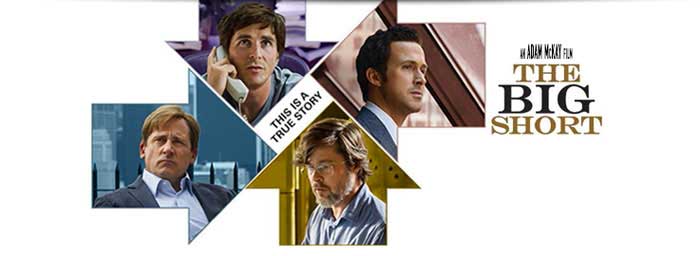Although “The Big Short” was released in American cinemas in 2016, its relevance as a film will endure for generations. Beautifully shot and ingeniously written, the movie recounts the extraordinary tale of a handful of financial investors and businessman who foresaw the stock market crash of 2008, and the different choices they subsequently made—some to try to save the housing market, and others to profit off of the impending disaster. Interestingly, the movie's significance is in no sense time-contained: although the events of the narrative take place in the early twenty-first century, the film poses questions about the ethics, practices, and future of Wall Street that ought to linger in our cultural consciousness for decades.
The ensemble cast of “The Big Short”—which includes Christian Bale, Ryan Gosling, Steve Carell, Brad Pitt, and many others—does a tremendous job in developing and maintaining the complicated atmosphere of the film. Gosling is unctuous yet irresistible as Jared Vennett, the crafty but morally devoid businessman that the audience loves to hate. Bale is both endearing and surprisingly convincing as astute but socially inept physician and hedge fund manager Michael Burry—a far cry from his usual role as charismatic hero. Pitt lends the film surprising and oft-invaluable moral gravity as Ben Rickert, a retired financial genius fed up with the opportunistic ethos of Wall Street. And Carell, as Mark Baum—the obstinate, indomitable banker who predicts the financial disaster that would ultimately bring the world economy crashing down—is simply superb. Carell plays the role with humor, passion, and most importantly, absolute conviction: through his inimitable portrayal of a virtuous man working on Wall Street during one of the most shameful moments in its financial history, the audience is granted full access to the complex world of American business.
The film is spliced with images and clips from music videos, political footage, and other cultural images from the early 2000s, effectively imbuing the narrative with the same atmosphere of confidence and prosperity that characterized twenty-first century America before the crash. When the economy eventually falls in “The Big Short,” the audience can practically feel the fear and perplexity of the national public. Most striking of all, though, are the moral questions inherent in the actions of the film's main characters: because we are privy, in hindsight, to the same information as Vennett, Burry, Rickert, and Baum, the audience is faced indirectly with a number of difficult choices. Very few of us knew before 2008 what the stock market would become, but what would we have done if we had? Would we, like Vennett, have apathetically attempted to make money off of our singular knowledge? Would we have worked tirelessly, like Baum, to warn the world of the coming disaster even in the face of heavy ridicule? Or, like Rickert, would we have simply been struck silent by the magnitude of the catastrophe at hand?
Overall, “The Big Short” has emerged as one of the most important contemporary cultural representations of the American business world. The film is an equal parts a slick story of successful investing, and a haunting cautionary tale; however, it is by no means a pessimistic indictment of Wall Street. On the contrary, it is a thoughtful and honest chronicle of the years leading up to one of the greatest financial disasters in history—and a stunning depiction of the lives and ideals of the men who saw it coming.

